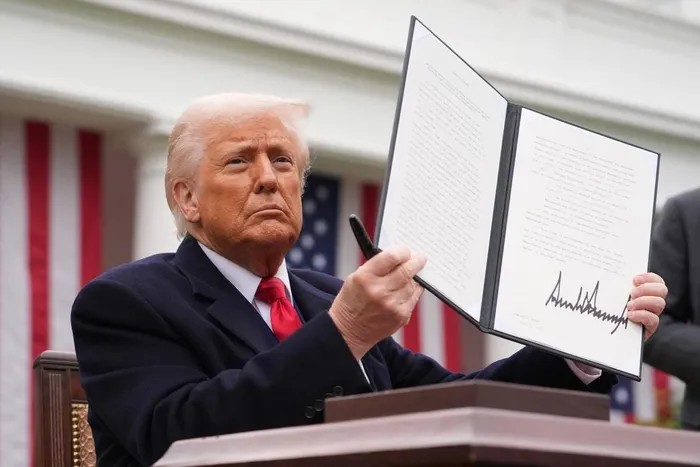From Hamilton’s 'You’ll Be Back' to backfiring tariffs – the long legacy of US trade barriers

President Donald Trump is the latest in a long line of American leaders to try implement tariffs.
Image: ANDREW HARNIK / GETTY IMAGES NORTH AMERICA / AFP
For anyone who has seen the Broadway musical, Hamilton, which tells the life-story of one of the US’ founding fathers, you’ll be more familiar with the scene in which “King George III” sings “You’ll Be Back” in response to the American Revolutionary War than Alexander Hamilton’s role in tariffs.
Yet, Hamilton was key in what must be one of the oldest tariff proposals in the US’ history. In 1789, he communicated the Act Laying Duties on Imports was to the United States House of Representatives, proposing that imported goods be more expensive, which would force Americans to buy more homemade products and boost the local manufacturing sector.
While the direct results of Hamilton’s tariffs are lost to history, this Act was followed by many more. In fact, the US has a long history of imposing import duties, with serious – yet unintended – negative consequences.
The latest trade war is due to US President Donald Trump’s recent imposition of tariffs, which varied widely from his first “Liberation Day” announcement and have already been extended beyond August 1 for negotiations – except for South Africa and other countries that received a letter.
In a 1976 paper detailing the background and emergence of the US Trade Commission, author John Dobson commented amid its 146 pages that: “Perhaps the safest conclusion one can draw from a study of tariffs in general, and the history of the US tariff in particular, is that change, and controversy are ever present and perhaps inevitable.”
Among examples of tariffs that have failed to achieve their intended economic or political objectives are:
1. Embargo Act of 1807
The Embargo Act of 1807 was a trade restriction law that sought to pressure Britain and France to respect US neutrality during their conflict. The Act prohibited American ships from trading with foreign nations, intending to avoid war and protect American interests. However, it backfired by severely harming the US economy, particularly in New England, where maritime trade was vital. The Act was widely evaded and led to widespread protests, ultimately being repealed in 1809.
2. Tariff of 1828 (Tariff of Abominations)
The Tariff of 1828 aimed to protect Northern industries by imposing high duties on imported goods. However, it was vehemently opposed by Southern states, particularly South Carolina. The push back was that it harmed their economy by raising the cost of imported goods. The tax led to the Nullification Crisis, during which South Carolina threatened to secede from the Union. This issue was resolved with the Tariff of 1833, which gradually reduced duties.
3. Payne-Aldrich Tariff Act (1909)
The Payne-Aldrich Tariff Act was meant to reduce tariffs, but the version passed by Congress raised duties on some goods instead. The outcome alienated progressive Republicans, deepening divisions within the party. Its failure to deliver on reform promises contributed to the Republicans’ loss of control in the following elections.
4. Smoot–Hawley Tariff Act (1930)
Passed during the Great Depression, the Smoot–Hawley Tariff Act is one of the most notorious tariff laws in US history. It raised tariffs on more than 20,000 imported goods, prompting widespread retaliation from trading partners. The result was a collapse in global trade, which economists agree worsened the economic crisis instead of easing it.
5. Steel Tariffs of 2002
In 2002, President George W. Bush introduced tariffs on imported steel to shield the domestic industry. While intended to protect American jobs, the move triggered retaliatory tariffs and pushed up costs for local manufacturers dependent on steel imports. Mounting criticism and economic fallout led to the tariffs being scrapped in 2003, highlighting the risks and unintended consequences of protectionist trade measures.
“These examples highlight the need to weigh the economic and diplomatic consequences of tariff laws. While tariffs may shield local industries, they can also trigger retaliation, strain trade ties, and harm the broader economy,” said business leadership consultant Guy Whitcroft.
IOL
Related Topics: